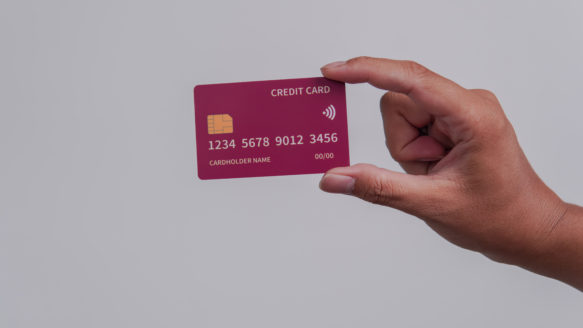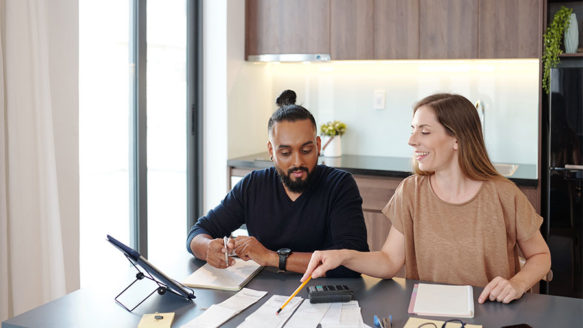
How to Stop Stressing About Money & Avoid Burnout
With many people facing added mental, emotional and financial stress, our overall health has never been more important. If you’ve been feeling less than yourself lately, you’re not alone. It’s normal to feel burnt out from everything that’s been going on. Unfortunately, burnout can extend to all parts of your life―from work to family and everything in between, including your finances.
Symptoms of financial stress
There are obvious symptoms of financial stress that we can identify when we experience significant situations in our lives, as well as more subtle signs of burnout that can make problem solving seem impossible. Watch for these signs and symptoms of financial burnout:
- Constantly thinking about your budget, or lack thereof
- Feeling stressed about where your money is coming from and where it’s going
- Feeling guilty, exhausted, depressed or overwhelmed about your finances
- Feeling cynical or apathetic towards your financial goals
- Lack of sleep or increased anxiety just thinking about money
If you are experiencing any of these symptoms, you’re probably struggling with financial burnout. Luckily, there are ways to combat this so you can get back to feeling like you again―without your money dragging you down.
Have questions?
Need more information or want to talk to a certified financial counsellor for peace of mind? Let us help.
Call 1-888-294-0076 or fill out this form to speak with a certified financial counsellor. It’s free for all Albertans.
8 strategies to stop stressing about money
Stressing about money can be a fast downward spiral that prevents you from moving forward to a more manageable situation. We have been working with individuals and families for over 20 years and have identified some concrete ways to take control of your finances. Don’t let your budget burn you out! Try these eight ways to stop stressing about money:
- Don’t let money consume your thoughts
If money has been consuming your daily thoughts, this is the time to take a step back and let go of the past. You won’t be able to reach your financial goals, pay down your debts or make more money if you’re physically or emotionally drained. Make a conscious effort to not look at your bank account for a week and resist the urge to fill that newfound energy or time with something else.
- Get organized
What’s the best way to help you stay on top of your finances? Get your finances organized and focus on the future! Understand the finer details of your finances, like when you get paid, when your bills are due, your monthly budget and your savings. Find an organizational tool that works for you―whether that’s in an app, spreadsheet or journal. We have lots of great resources to help you get started!
- Let go
Are you doing something regularly that stresses you out? Are you simply going through the motions without feeling like you’re getting enough from it? Learn to let go of the habits, routines and things that are weighing you down. Whether the act of couponing isn’t serving you anymore or the thought of journaling everyday gives you anxiety, let go of any preconceived notions you may have and make room in your life for the things that truly work for you. This is also the time to let go of any guilt you may be feeling about past financial mistakes.
- Set up monthly auto payments
If you haven’t set up monthly auto payments yet, why not? Take the guesswork out of your monthly payments so you never feel strapped for cash or worried about making payments on time. Keep track of your upcoming payments in your money diary so you’re aware of what’s coming in and going out of your bank account each week. And then don’t forget to check your bank statements at the end of each month to make sure your payments went through!
- Talk to someone about your financial stress
Sometimes life can become overwhelming―and your finances can play a big role in that. If you’re struggling to manage everything alone, it’s time to talk to someone about the financial stress you’re experiencing. Whether you decide to talk to a trusted family member, friend or therapist or book an appointment with one of our understanding, accredited counsellors, talking about your finances and the feelings associated with it can help you tremendously. Remember: You’re not alone in your financial journey and it’s okay to not be okay.
- Manage your health to build wealth
Stress is a big factor when it comes to declining health, so it’s important to be mindful of how your financial burnout is affecting your physical, mental and emotional wellness. You can reach all the financial goals in the world, but they won’t mean anything if your health suffers along the way! Focus on nurturing self-care and prioritizing your health. Educate yourself on ways you can manage your financial stress through breathing exercises, working out, meditation, drinking lots of water, sleeping more, spending more time doing the things you love, and being with people who make you happy.
- Focus on your financial goals
What―and who―are you budgeting for? Where do you want to see yourself in five years? Focus on your financial goals and reassess. Are some of them just a little too out of reach right now (and are therefore stressing you out more)? Focus on the financial goals that inspire, excite and motivate you. Remember why you are doing what you are doing and how you plan to get there. And then write it down! Whether you choose to write it in your money diary, create a cell phone wallpaper or simply tape it to your bathroom mirror, the important thing is to keep yourself accountable. Incorporating simple money mantras into your life can also help you feel more connected with your finances and change your money mindset.
- Live a little
Don’t make the mistake of budgeting out fun! Budgeting, like dieting, is all about balance and choosing moderation over deprivation. If you restrict too much, you’ll feel unmotivated and less likely to see your financial goals through. Make sure to incorporate fun with friends, date nights and “splurges” like spa days, hair cuts or coffee runs. Acknowledge your hard work by rewarding yourself when you need to.
Have questions?
Need more information or want to talk to a certified financial counsellor for peace of mind? Let us help.
Call 1-888-294-0076 or fill out this form to speak with a certified financial counsellor. It’s free for all Albertans.








